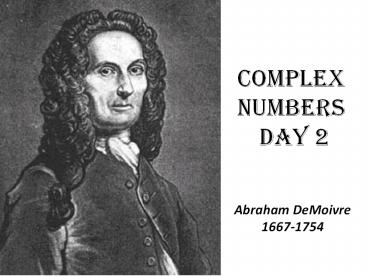Complex PowerPoint PPT Presentation
Title: Complex
1
Complex Numbers Day 2
Abraham DeMoivre 1667-1754
2
Some Properties of the Argument
Do these look familiar?
3
Ex. 1 If find the
modulus and argument of
a) b) c)
a)
b)
why?
4
c)
5
Your calculator will convert between polar and
Cartesian in complex number form
Try typing in
Using the MATH? CPX menu, you can use your
calculator to find the conjugate, real part,
imaginary part, argument (angle feature), and
modulus (abs feature) of any complex number.
This menu will also convert forms for you. Try
converting
into polar form
This may look strange,
but recall that Eulers Formula is
6
Who was De Moivre?
A French mathematician who was persecuted in
France because of his religious beliefs. De
Moivre moved to England where he tutored
mathematics privately and became friends with Sir
Issac Newton.
De Moivre made a breakthrough in the fields of
probability (writing the Doctrine of Chance), but
more importantly for IB HL students he moved
trigonometry into the field of analysis through
complex numbers with De Moivres theorem.
7
DeMoivres Theorem
Used to find powers of complex numbers when
theyre in polar form
8
Ex. 2 Find the exact value of
using DeMoivres Theorem. Check your
answer by calculator.
Write in polar form first
9
nth Roots of Complex Numbers
For instance the 4th roots of are the
four solutions of
Ex. 3 Find the four 4th roots of 1 by a)
factorization b) the nth roots method
a)
10
b)
(polar form)
(Demoivres Thm)
At k 0, 1, 2, 3
11
Ex. 4 Find the fourth roots of -4 in the form
and then factorize
into linear factors. Hence, write as
a product of real quadratic factors.
k 0, 1, 2, 3
12
Linear factors
FOIL out
Quadratic Factors
13
nth Roots of Unity
The nth roots of unity are the solutions of
Ex. 5 Find the three cube roots of unity. If w is
the root with smallest positive argument, show
that the roots are 1, w, and w2 and that
k 0, 1, 2
14
Since the question asked us to let w be the root
with the smallest positive argument,
PowerShow.com is a leading presentation sharing website. It has millions of presentations already uploaded and available with 1,000s more being uploaded by its users every day. Whatever your area of interest, here you’ll be able to find and view presentations you’ll love and possibly download. And, best of all, it is completely free and easy to use.
You might even have a presentation you’d like to share with others. If so, just upload it to PowerShow.com. We’ll convert it to an HTML5 slideshow that includes all the media types you’ve already added: audio, video, music, pictures, animations and transition effects. Then you can share it with your target audience as well as PowerShow.com’s millions of monthly visitors. And, again, it’s all free.
About the Developers
PowerShow.com is brought to you by CrystalGraphics, the award-winning developer and market-leading publisher of rich-media enhancement products for presentations. Our product offerings include millions of PowerPoint templates, diagrams, animated 3D characters and more.

